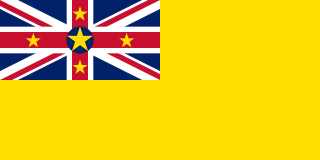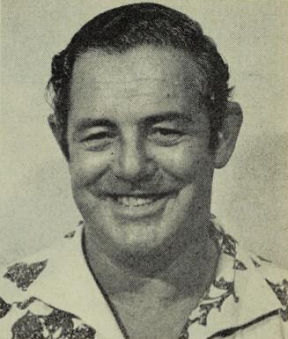 |
|---|
General elections were held in the Cook Islands on 13 October 1958, [1] the first under universal suffrage.
 |
|---|
General elections were held in the Cook Islands on 13 October 1958, [1] the first under universal suffrage.
Following the recommendations of the 1955 Belshaw-Stace Report, the 23-member Legislative Council was replaced by a 27-member Legislative Assembly. [2] [1]
Of the 27 members, 15 were directly elected; 14 from ten general constituencies and one from a European voter constituency. [2] Seven members were indirectly elected by Island Councils (four from Rarotonga and one from Aitutaki, Atiu and Mangaia). [2] The remaining five members were officials, including the Resident Commissioner as President of the Assembly, the Administration Secretary, the Treasurer and two members appointed by the Resident Commissioner. [2]
A total of 65 candidates contested the directly elected seats, including former Legislative Council member Willie Watson, who ran under the name Viri Vokotini in one of the general constituencies. [1]
Frank Bateson and former Chief Judge Alfred McCarthy contested the European seat. [1]
| Constituency | Candidate | Votes |
|---|---|---|
| Aitutaki | Tuakeu Puna | 545 |
| Urikore Cummings | 340 | |
| Kiikoro Kaoki | 202 | |
| Tere Kainuku | 186 | |
| Rave Pitomaki | 129 | |
| Ruatangi Daniela | 85 | |
| Rima Tamatoa | 77 | |
| Ponoua Raki | 48 | |
| Atiu | Vainerere Tangatapoto | 141 |
| Ngamaru Ariki | 70 | |
| Mana Ariki | 51 | |
| Nono Tearapo | 46 | |
| Tangata Poto | 41 | |
| Michael Toki | 34 | |
| Mangaia | Ngatupuna Matepi | 408 |
| Maarateina Atatoa | 267 | |
| Edwin Gold | 17 | |
| Puati Ngatama | 11 | |
| Manihiki | Tihau Napara | 56 |
| Adamu Toka | 51 | |
| Ben Ellis Jr. | 47 | |
| Tekake William | 45 | |
| John Dean | 20 | |
| Apii Karaponga | 11 | |
| Mauke | Dave Niovara | 108 |
| Julian Dashwood | 107 | |
| Tangata Taia | 26 | |
| Auru Tairea | 20 | |
| Temana Ngatama | 14 | |
| Aitu Rairi | 9 | |
| Mitiaro | Tama Tetava | 71 |
| Taia | 27 | |
| Penrhyn | Tangaroa Tangaroa | 238 |
| Parekaa Tereora | 48 | |
| Tiavare Tini Josepha | 26 | |
| Tinirau Tata | 15 | |
| Nikau Mita | 8 | |
| Mahutapiki Pange | 8 | |
| Pukapuka | Ine Rutera | 138 |
| Arona Tariau | 77 | |
| Paata Eliu | 69 | |
| Henry Winau | 63 | |
| Taumaina Utarenga | 28 | |
| Rakahanga | Toka Mataio | 37 |
| Umutai George Greig | 32 | |
| Ngametua | 16 | |
| Tupou Piho | 6 | |
| Rarotonga | William Hugh Watson | 1,628 |
| Glassie Strickland | 723 | |
| Tamarua Joseph Browne | 620 | |
| Napa Tauei Napa | 548 | |
| Teariki Tuavera | 496 | |
| Frederick Aratiri Rennie | 473 | |
| Manea Tamarua | 434 | |
| Apenera Short | 418 | |
| Tui Pori Makea | 376 | |
| Ngaeikura Tou | 367 | |
| Ernest Taripo | 339 | |
| Naea Teariki Maurangi | 318 | |
| Teariki Puia | 220 | |
| Pu Tamaiva | 190 | |
| Tita Enoka Anautoa | 112 | |
| European | Frank Bateson | 94 |
| Alfred McCarthy | 59 | |
| Aitutaki Island Council | Kau Mapu | — |
| Atiu Island Council | Teariki Vaine | — |
| Mangaia Island Council | Pokino Aberahama | — |
| Rarotonga Island Council | Makea Nui Teremoana Ariki | — |
| Margaret Makea Karika Ariki | — | |
| Dick Charles Brown | — | |
| Areora Ira | — | |
| Source: [3] [4] | ||

General elections were held in Fiji between 17 April and 4 May 1963. For the first time, women and indigenous Fijians were given the right to vote alongside the male European and Indo-Fijian population.

General elections were held in the Cook Islands on 20 April 1965 to elect 22 MPs to the Cook Islands Legislative Assembly. The elections were won by the Cook Islands Party and saw Albert Henry become the Cook Islands' first Premier.

General elections were held in Western Samoa on 4 April 1964, the first since independence in 1962. All candidates ran as independents. Following the elections, Fiamē Mataʻafa Faumuina Mulinuʻu II remained prime minister.

General elections were held in the Solomon Islands for the first time on 7 April 1965.

General elections were held in Fiji in August 1956; voting took place in the Eastern constituencies between 11 and 18 August, and on 18 August in all other constituencies.

General elections were held in Niue on 9 April 1966.

General elections were held in Western Samoa on 15 November 1957.

General elections were held in the Cook Islands in March 1956. The elections took the form of an election to Rarotonga Island Council, whose sole European member also automatically became the only elected member of the Legislative Council. Incumbent member Henley McKegg was narrowly re-elected, defeating R.J.A. Ingram by three votes.

General elections were held in Papua and New Guinea on 31 August 1957.

General elections were held in the Cook Islands in 1953. The elections took the form of an election to Rarotonga Island Council, whose sole European member also automatically became the only elected member of the Legislative Council.

General elections were held in Papua and New Guinea on 27 August 1960.

General elections were held in Western Samoa on 4 February 1961. They had originally been planned for November 1960, but were postponed by three months.

General elections were held in the Territory of Papua and New Guinea on 18 March 1961. Indigenous members were elected for the first time, although on an indirect basis. The territory's first political party, the United Progress Party, won three seats.

General elections were held in the Cook Islands in May 1961.
Henley Robert McKegg was a New Zealand-born Cook Islands politician. He served as a member of the Legislative Council between 1953 and 1958.

General elections were held in the Territory of Papua and New Guinea between 15 February and 15 March 1964. They were the first elections in the territory held under universal suffrage. Voter turnout among enrolled voters was 65%.

Dick Charles Brown was a Cook Islands businessman and politician. He served as a member of the Legislative Assembly between 1958 and 1965, and became the territory's first Leader of Government Business in 1963.

Legislative Council elections were held in the Cook Islands in 1947, the first after the establishment of the new legislature.

Donald Barrett was an Australian planter, army major, politician and sports coach in the Territory of Papua and New Guinea. He served as a member of the Legislative Council and House of Assembly in two spells between 1951 and 1968.

Ngatupuna Matepi (1909–1977) was a Cook Islands politician. He served as a member of the Legislative Assembly from 1958 until his death, had two spells in the cabinet between 1962 and 1965, and became the first official Leader of the Opposition in 1968.